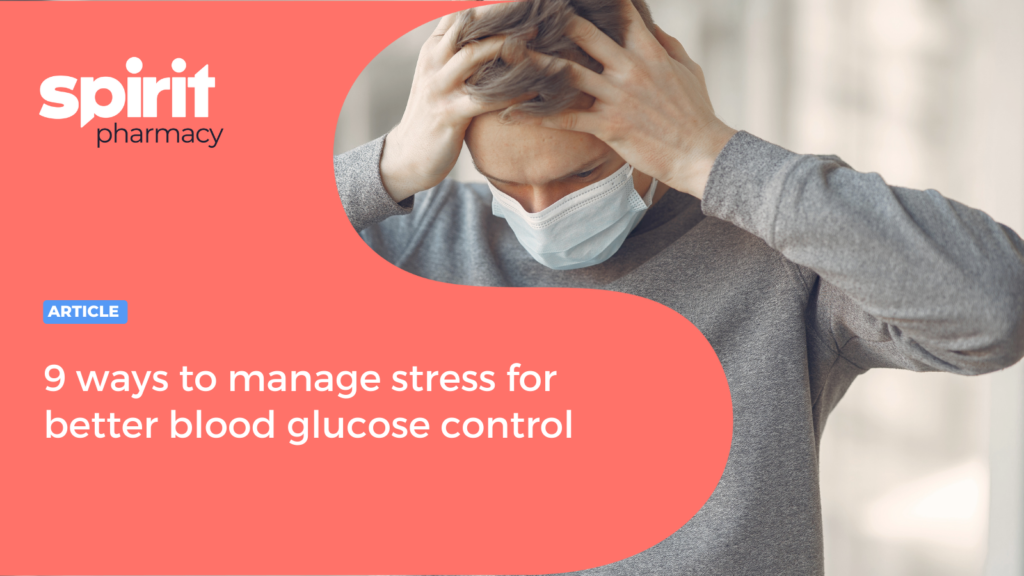
In our very first edition of our Diabetes Treatment “Need to Know” series, and as part of our focus on mental health, Roma, the newest pharmacist to join the Spirit Pharmacy family, talks us through everything you need to know about taking anti-depressants when living with diabetes.
Is there a link between diabetes and depression?
Yes, there is. According to NICE (National Institute for Health and Care Excellence), depression is three times more common in patients with diabetes.
You may feel overwhelmed in managing your diabetes, its complications or simply knowing that the condition is long-term. You may feel restricted in eating your favourite foods, feel obliged to take diabetic medication regularly, or often experience symptoms that affect your quality of life.
These are some factors that may occasionally cause a low mood, but if you start experiencing long periods of sadness, it is important to see a healthcare professional to rule out depression.
What are the most common anti-depressants people with diabetes are likely to be prescribed?
Medication is not actually the first step to treat depression. If you have mild to moderate depression, your doctor is initially likely to recommend lifestyle changes, such as exercise, mindfulness, counselling, and cognitive behavioural therapy to encourage self-help.
If these are ineffective, or if you have moderate to severe depression, then your doctor is likely to recommend medication. There are three main classes of anti-depressants.
Which anti-depressant your doctor prescribes will be dependent on your personal medical history, any existing conditions and what may work for you. The most common examples of anti-depressants include sertraline, fluoxetine, citalopram and duloxetine.
Are there any dangers to taking anti-depressants alongside my diabetes meds?
Anti-depressants and diabetic medication are safe to take together. However, anti-depressants can interact with other medication, such as ibuprofen, so I highly recommend reading the patient information leaflet for your anti-depressant to know which medication to avoid.
Anti-depressants can have several side-effects, which may appear similar to the symptoms of a hypo in diabetes, or to side effects of common diabetic medication, such as indigestion, dizziness or feeling shaky, so it is important to keep up-to-date with your regular diabetic checks.
Please be patient with anti-depressants as it can take two to four weeks before you feel any better!
Can anti-depressants affect my blood sugar levels or increase the risk of a hypo?
Studies have been conducted on certain anti-depressants which have suggested there may be a possible link between their long-term use and the risk of developing type 2 diabetes, but there is little evidence to suggest that anti-depressants directly cause a rise in blood sugar levels.
If your healthcare professional feels that a particular anti-depressant may not be suitable for you, then they will prescribe a different type as there are many options.
And with your regular diabetic checks, any fluctuations in blood sugar levels will be detected by your healthcare professional and appropriate action would be taken.
I often feel down due to my diabetes but am reluctant to go on to anti-depressants. What should I do?
I would advise speaking to your doctor and explaining your concerns. Based on your personal situation, the doctor is likely to recommend non-medicinal treatments at first, such as exercise and psychotherapy. If necessary, they may suggest anti-depressants.
Treating depression when you have diabetes is important as it can otherwise make it more difficult for you to manage your diabetes both physically and emotionally, as depression can heavily affect your choices.
For example, you may choose to comfort eat or skip meals, or prefer not to exercise when feeling low. These decisions could lead to poor blood sugar control over time.
Is there anything else you’d recommend for people who live with both diabetes and depression?
Dealing with diabetes can understandably cause feelings of stress, anxiety and low mood as it places emphasis on long-term diet and lifestyle changes, regular blood tests and adherence to medication.
If you feel overwhelmed and you need help, I would highly recommend asking your healthcare professional. A lot of people can feel anxious to start on a new anti-depressant but please don’t fear taking this step if necessary.
Ultimately, medication is there to help you. Any issues or concerns regarding side effects can be addressed by your healthcare professional and diabetes support groups are also available. You are not alone!
Thanks for lending us your expertise, Roma! Look out for the next edition of “Diabetes Treatment – “Need to Know”, where we’ll delve into common diabetes treatments & medications, explaining the top things you should know about them.
At Spirit Pharmacy we’re here to help people live well with diabetes. We offer free NHS prescription delivery, expert support, plus a free Live Well With Diabetes welcome pack with your first delivery.
Please note, this article is not intended to be individual healthcare advice. Always follow specific advice relating to your condition given to you by your doctor, pharmacist, diabetic nurse, or dietician.

Being diagnosed and living with diabetes is a stressful experience, and in addition to external factors like work-related stress, relationship or financial worries, or day-to-day things like children driving you up the wall or your daily commute, stress can have a real and serious impact on your health. This can affect your blood sugar levels as cortisol (the stress hormone) releases extra glucose into the bloodstream. Here are nine ways to reduce stress for better blood glucose control
- Reduce Caffeine
Studies show that drinking coffee (and to a lesser extent, tea) increases the stress levels in your body and releases cortisol, which increases blood sugar levels. Try to reduce caffeine gradually and look for decaf alternatives or herbal teas.
- Regular Exercise
Research shows that participating in regular physical activity can increase insulin sensitivity and assist with lowering blood glucose levels, as well as burn calories. For beginners, it is recommended to build up to 150 minutes of moderate aerobic activity, such as jogging or brisk walking, each week. You can even do home workouts or use online exercise videos if you do not want to go to the gym.
- Get Enough Sleep
A good night’s sleep supports your body and mind to tackle day to day stress more easily. If you are tired you can be less patient and more easily agitated which can increase stress. Most adults need 7 to 9 hours of sleep each night. Practicing stress-lowering tactics can also help improve your quality of sleep.
- Get Organised
Putting in some extra effort of getting organised, especially if this organisation extends to multiple areas of your life, can help reduce stress levels long term by requiring less last-minute scrambling in a variety of everyday situations.
- Find Time for Creative Pursuits
Creative pursuits like art and crafts, creative writing or woodworking can help focus the mind, and has even been compared to meditation due to its calming effects on the brain and body. Even just gardening or sewing releases the natural antidepressant – dopamine.
- Take Time Out
Feeling like you’re on the go all the time? Too much work and not enough play can contribute to problems feeling stressed out, so taking some time out to relax is essential for your health and mental wellbeing. Making yourself the priority may make you feel selfish, but if you do it on a regular basis it can help to reduce your stress levels.
- Breathe
Your breath is a powerful tool to ease stress and make you feel less anxious. Some simple breathing exercises can make a big difference if you make them part of your regular routine. Take a deep breath in. Now let it out slowly. You may notice a difference in how you feel already.
- Talk About It
Talking through your worries and concerns with family and friends is an important buffer against stress. It can be helpful to share your problems with people who care for you. If you live with Type 2 diabetes, you can connect to other people who understand what it’s like living with the condition on our dedicated Facebook group.
- Good Nutrition
Reducing junk food and refined sugars that are low in nutritional value and high in calories can stop us from feeling low on energy and sluggish, not to mention being unhelpful for managing your blood glucose levels. A healthy, balanced diet that is low in sugar, caffeine, and alcohol, can promote good health and reduce stress.
At Spirit Pharmacy we’re here to help people live well with diabetes. We offer free NHS prescription delivery, expert support, plus a free Live Well With Diabetes welcome pack with your first delivery.
Please note, this article is not intended to be individual healthcare advice. Always follow specific advice relating to your condition given to you by your doctor, pharmacist, diabetic nurse, or dietician.